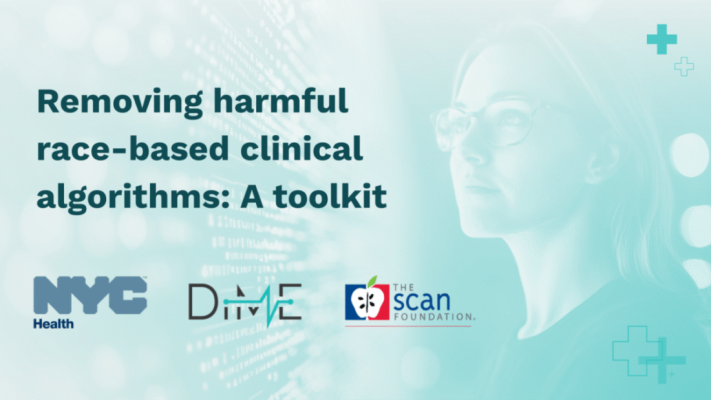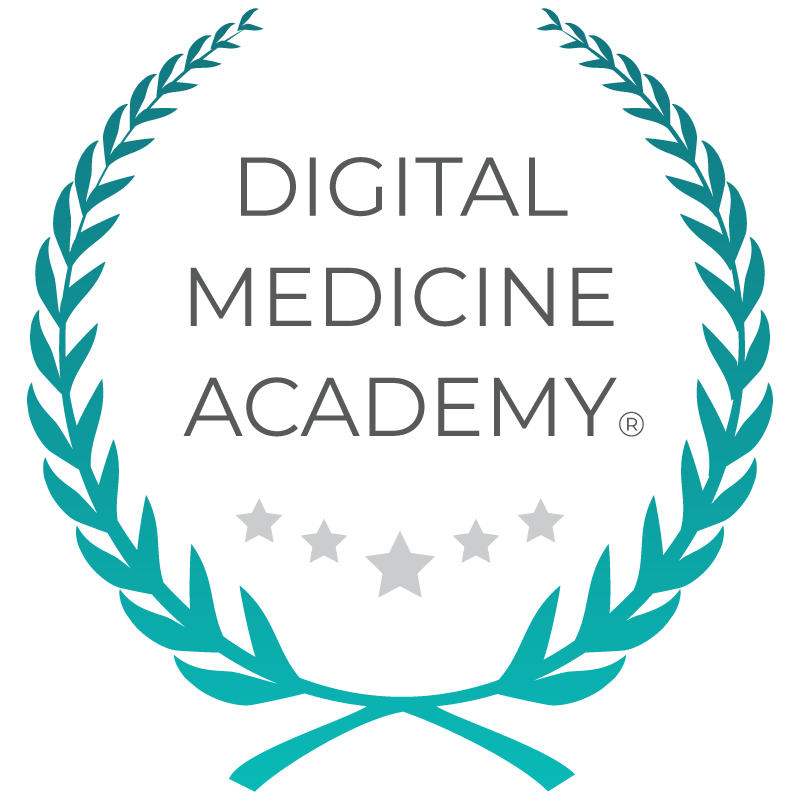
Improving patient outcomes: A roadmap to remove harmful algorithmic bias in healthcare
- Dr. Michelle Morse, Acting Health Commissioner, NYC Health Department
- Jennifer Goldsack, CEO, Digital Medicine Society
- Anika Heavener, Vice President of Innovation and Investments, The SCAN Foundation
When health systems in New York City (NYC) began removing harmful race modifiers from their medical algorithms, they demonstrated something profound: deeply embedded bias in healthcare can be identified and de-implemented. Now, a pioneering partnership aims to turn this city-wide success into national transformation.
The Digital Medicine Society (DiMe), New York City Health Department Coalition to End Racism in Clinical Algorithms (CERCA), and The SCAN Foundation have partnered to develop a much-needed tool for improving clinical decision-making and reducing bias in the era of digital healthcare. The mission: create an open-access toolkit that uses real-world experience to help healthcare systems nationwide identify and remove harmful algorithms from clinical practice to produce care decisions grounded in accurate, individualized, and evidence-based practices.
Many algorithms rely on flawed logic that uses race as a biological factor when it is, in fact, a social one. This conflation reinforces inequities, often depriving communities of color, including intersectional communities such as older adults, of timely and appropriate care.
Few individuals know that race-based calculations could affect their results when their doctor orders routine tests. For example, in the old standard, a Black person would need to show significantly worse kidney function than a white person to receive the same referral for specialist care. Or, an Asian person would need to demonstrate more severe lung damage to qualify for the same treatment. Older adults from marginalized communities are also vulnerable; for instance, an elderly Hispanic person with early signs of heart failure might face delays in diagnosis and care because race-adjusted algorithms have been known to underestimate their risk.
Bias in healthcare isn’t new—but in the era of artificial intelligence (AI), when healthcare systems are increasingly embracing algorithmic decision-making, we must use this moment to ensure our health systems advance equity rather than perpetuate historical disparities.
Building upon proven success
NYC Health CERCA’s work in New York City provides the foundation for this ambitious national effort. Since 2021, the coalition has successfully worked with seven out of nine major health systems in NYC to de-implement or address several race-based algorithms in one of three priority clinical areas.
Additionally, CERCA members joined successful advocacy efforts aimed at the American Thoracic Society to update recommendations around de-implementing race-based reference equations in spirometry. Their experience revealed crucial insights about what drives institutional change.
Dr. Morse and her team conducted listening tours with healthcare organizations across the city, finding what she calls “softened soil” for reform. The coalition’s early victories surprised even its organizers. Within two years, member hospitals had successfully removed several race-based algorithms from their systems. However, the process also revealed just how deeply these algorithms were embedded in medical practice.
NYC Health CERCA’s work has informed the development of the toolkit that can be utilized and scaled nationally. “Nothing about this is purely technical,” notes Jennifer Goldsack, CEO of DiMe. “The changes needed are a result of working with health systems and clinicians, many of whom had actually been trained over recent decades to trust and use these algorithms. Codifying these changes requires education, thoughtful consideration, and genuine human connection.”
A toolkit for transformation
This new partnership brings together the complementary expertise of three entities: NYC Health CERCA’s proven implementation experience, DiMe’s proven approach to building inclusive, actionable roadmaps that advance the adoption of digital solutions while prioritizing equity at scale, and The SCAN Foundation’s deep understanding of vulnerable populations’ healthcare needs.
Change management and clinical education form the heart of the toolkit’s approach. Through comprehensive leadership engagement strategies and evidence-based educational materials, healthcare systems will not just learn why race-based algorithms are harmful but also the steps needed to implement and communicate these critical changes effectively throughout their organizations.
Patient engagement and impact measurement round out the toolkit with strategies for identifying and supporting people affected by biased algorithms while offering robust protocols to track progress and demonstrate real improvements in health equity.
The toolkit is freely available as of April 23, 2025, and the intent is for it to be regularly updated to keep pace with evolving healthcare technology and health equity research. “This isn’t a static guide,” Goldsack emphasizes. “It’s a dynamic resource designed to grow and adapt as we learn more about removing bias from healthcare algorithms. Our goal is to support healthcare systems through this critical transformation while ensuring it remains flexible enough to evolve with new challenges and insights.”
Capitalizing on this critical moment
The timing of this initiative is crucial. As healthcare undergoes rapid digital transformation, the patterns established now will shape medical practice for decades to come. At a time when conversations around healthcare policy, trust, and fairness are more visible than ever, ensuring that care decisions are grounded in accurate, individualized, and evidence-based practices is essential.
The collaboration aims to create a new standard where harmful algorithms are simply unacceptable in clinical practice. By providing healthcare systems with both the tools and the evidence that change is possible, the initiative seeks to transform how healthcare approaches algorithmic decision-making.
The toolkit, now available for use, represents a critical step toward ensuring that the digitization of healthcare advances equity rather than entrenching disparities. For people whose care has been silently shaped by these biased algorithms, that change can’t come soon enough.
Learn more!
If you are a patient, it is important to know that your healthcare provider may be updating certain care practices to ensure that medical decisions are based on your individual health needs—not race. Use these resources to help you manage your care.
Healthcare systems and departments of public health interested in learning more about the toolkit can join DiMe’s email list for updates on the toolkit’s development.



